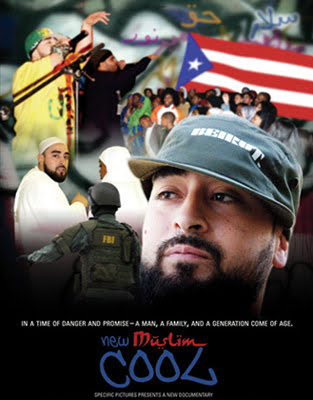An Intimate Look at Hip-Hop’s Jihad
By Suad Abdul Khabeer
http://planetgrenada.blogspot.com/2009/06/intimate-look-at-hip-hops-jihad.html
June 23, 2009
‘New Muslim Cool,’ a new PBS documentary, shows how young Muslim Americans in the post-9/11 era are deepening ties between hip-hop and Islam
Real hip-hop heads know that Islam and hip-hop have been longtime friends, feeding off each other’s energy. Muslim ideals of self-respect and social change have inspired some of the greatest emcees, and hip-hop is giving voice to the dreams and daily struggles of a generation of Muslims. This cross-pollination between Islam and hip-hop is vividly illustrated in a new documentary, New Muslim Cool, which premieres tonight on PBS.
Directed by veteran filmmaker Jennifer Maytorena Taylor, New Muslim Cool chronicles three years in the life of Hamza “Jason” Perez, a Puerto Rican Muslim, family man, emcee, interfaith prison chaplain and social activist.
So why is Hamza’s story called the New Muslim Cool? Because he is part of a generation of young Muslims who are coming of age in a post-9/11 America. They are tackling questions of race, faith, freedom and even, as Hamza does, questionable intrusions by the FBI. They unapologetically choose God and country; they are doing American Islam with style.
And then, there’s the music. Citing influences such as Malcolm X and Pedro Albizu Campos, Hamza and his brother, Suliman, bring together the best of who they are. They use hip-hop in the great music traditions of the African Diaspora. The music seeks to speak to the harsh but sweet realities of everyday life; to encourage an elevation of the spirit, and to inspire a commitment to social change.
Set in Pittsburgh, Pa., the film opens with Hamza’s words (played over a hip-hop track by his group, M-Team): “I would always have two consistent dreams my whole life; one, that I was gonna experience death at the age of 21, the other that I was gonna be in jail, and then, both of them came true.”
He describes his conversion to Islam at the age of 21 as a “death of all my past, the negative.” Hamza finds Islam on the same street corners where he hustled as a drug dealer, and as a Muslim, he returns to the streets to offer a way out to the “30 below”: young, black and Latino men under age 30 who see drugs as their only path to the American Dream.
Inspired by his spiritual awakening, Hamza seeks to “move the crowd” as he himself was moved. And in many ways, his story is the quintessential hip-hop track, a journey from the rags of ignorance and desperation to the riches of knowledge and empowerment.
Eventually, Hamza does make it to jail, but it is not as an inmate as he had anticipated. Instead, he winds up as a chaplain providing spiritual guidance to prisoners of all faiths.Yet, Hamza’s story also extends beyond his religious community. His struggles echo the realities of many young Latino and black men. His mother, Gladys Perez, is a single parent who worked two jobs to keep her children in Catholic school and off the streets in a local community that lacked the economic, educational and political resources to support her.
In the face of these familiar circumstances, Hamza, then only known as Jason, chooses a likely path, drug dealing, which he later successfully rejects. Yet, Hamza’s gritty life story also has its softer side. Pushing back against two popular stereotypes—sexist Muslim men and absent “baby daddies”—Hamza is lovingly building a blended family, made up of his two children from a previous marriage and his African-American wife, Rafiah, and her daughter. In the film, he is seen cracking jokes as he rubs his abuela’s feet. It is a story resonating beyond Muslim and hip-hop audiences.
At numerous screenings, whether national or international, it is clear that viewers are moved deeply by Hamza’s growth as a Muslim and as a man. Because at its core, the New Muslim Cool is about the struggle to respond to adversity with your better self. It’s about finding beauty in the least expected places. Set over the treble and funk, it tells a story we can all relate to, about the complexities of what it means to be imperfectly human. New Muslim Cool premieres on PBS tonight. Check local listings.
Suad Abdul Khabeer is a doctoral candidate in the Department of Anthropology at Princeton University.

